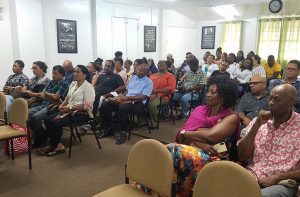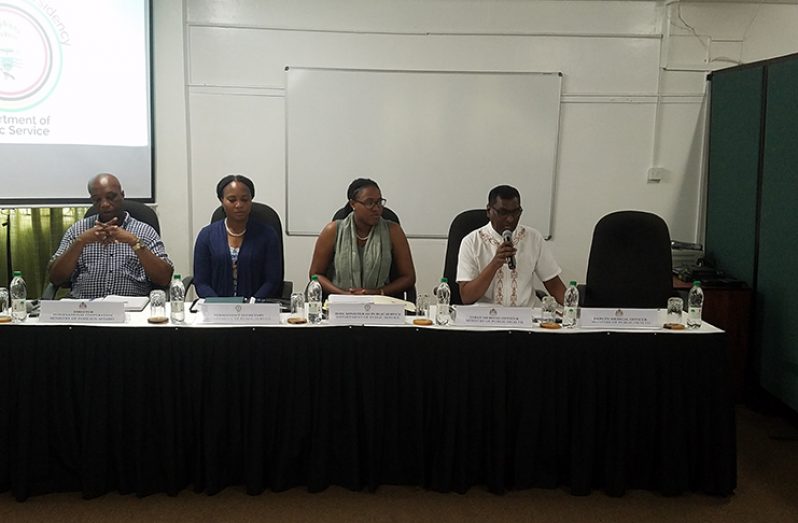–will continue to monitor their well-being
ATTEMPTS to bring Guyanese students home from China can increase their risk of contracting the Coronavirus, Minister of Public Service Tabitha Sarabo-Halley warned while announcing Government’s decision to have the students remain in China.
“Government is not putting plans in place to bring students home,” she said. “After listening and hearing what’s happening in China, and examining our own situation in Guyana, we decided it’s best for them to remain there, because the more movement, the more the possibility of exposure to the virus. Staying put in the hostel significantly reduces the likelihood of contracting the virus,” Minister Sarabo-Halley said during a meeting with the parents of those students on Saturday.
A team of government officials met with parents and other representatives of Guyana-China scholars at the Training Division of the Department of Public Service in the Ministry of the Presidency, on Vlissengen Road and D’Urban Street, Lodge.
The team consisted of Minister Sarabo-Halley; Permanent Secretary of the Department of Public Service, Soyinka Grogan; Chief Medical Officer Dr. Shamdeo Persaud; and Director of International Cooperation of the Ministry of Foreign Affairs Forbes July.
According to a press statement from the Ministry of the Presidency, the meeting was convened to inform parents and other representatives of the students about steps being taken by the Government of Guyana and China to manage the affairs of the scholars in light of the recent outbreak of the human coronavirus in China.
According to the records of the Department of Public Service, there are 50 Guyanese students pursuing studies in China. Ten of those students, however, are currently not in China.
Minister Sarabo-Halley assured the parents that the decision to let the students remain in China was not made unilaterally, but came after a meeting on Thursday among the Ministers of Public Health, State, Foreign Affairs, Citizenship and Department of Public Service, along with senior technical officers from the respective ministries, and the head of PAHO in Guyana.
The decision took into consideration advice received from the Chinese Ambassador to Guyana, as well as local and regional medical practitioners.
“They have everything; they know what to do if the virus is contracted, and so that is the best place for them at the current stage. Because, once they start moving, we don’t know what will happen,” said Minister Sarabo-Halley.
She said that while government remains concerned, it is recognised that there will be difficulties should attempts be made to bring the students home, whether by government or their relatives, since they will have to be quarantined at various transit points.
INADVISABLE
In explaining this point, Minister Sarabo-Halley said: “For them to move from one province to the other to get out is a 14-day wait; a 14-day quarantine period. And that could happen for a while before they actually get out. So, it’s not that the government doesn’t care about the students. We have taken that into consideration.”

Among concerns raised by parents and other representatives of the students was the lack of adequate supplies and information for the students, who are currently restricted to their place of residence.
In response, Minister Sarabo-Halley committed that herself and other members of the team of government representatives will endeavour to collect and disseminate accurate information on the situation as it pertains to each student currently in China on Government of Guyana-Government of China scholarships.
In trying to provide some level of comfort to the parents of those students, Dr. Persaud said that the confirmed deaths from the virus are mostly among persons who were already in poor health.
“The virus is not an aggressive one like Ebola. Most of the persons who succumbed; who get very sick and die are older persons,” Dr. Persaud said, adding: “And what they have also noted is that all of them are above 55 years. And most of these people also have poor morbidity, or underlying conditions. They are diabetics; they have kidney problems; they have lung problems. They have noted that a lot; about 33 per cent of them already had smokers’ complications in their lung. So, most of these people already had a high risk, and most of them, even if they get the regular flu virus, some of them will sometimes succumb too.”
In addition, he said that there are 18 countries outside of China which have registered cases of the virus, for which vaccines are currently being developed. He reiterated that the students are better off remaining in China during this period of the outbreak.
Further, the CMO said surveillance systems have been established at the various ports of entry locally, and suspected victims will be quarantined in keeping with the internationally-recognised standards.
“What we have at the two airports, Moleson Creek and the various ports, is if we identify someone that is coughing, we put a mask on that person to prevent them from dropping the droplets around the environment, once we get the person into isolation. So far, we have two sites that we have developed; one at Georgetown Hospital, and we have a small area at Diamond. Last night we were also told both Ogle and Timehri will have a separate room to conduct our examinations,” said Dr. Persaud.
Meanwhile, Fariz Khan, an Obstetrician who has been working in the local health sector for the last decade, said his sister is currently pursuing her Master’s in China.
He encouraged those present at the meeting to recognise the advice being given as the best in the current circumstances. He also reminded of previous outbreaks of viruses such as Zika, Ebola H1N1, and SARS.



.jpg)








